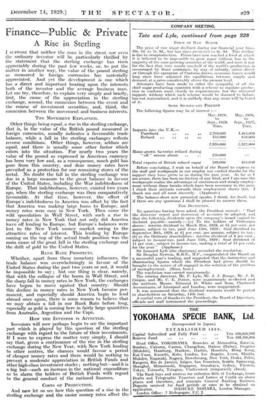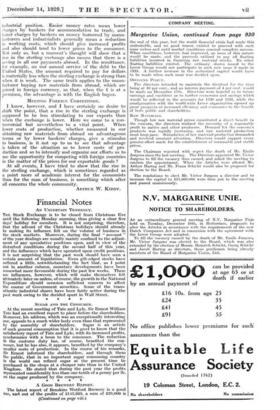Finance—Public & Private
A Rise in Sterling
I SUPPOSE that neither the man in the street ,nor even the ordinary investor will be particularly thrilled by the statement that the sterling exchange has risen appreciably _during- the past few weeks, or, to put the. matter in another way, the value of the pound sterling as measured in foreign currencies has materially appreciated. And yet the development is one which has a direct and important bearing upon the interests both of the investor and the average business man. Let me try, therefore, to explain very simply and briefly, first, the cause of the appreciation in the sterling exchange, second, the connexion between the event and the course of investment securities, and, third, the connexion between the movement and business interests.
THE MOVEMENT EXPLAINED.
Other things being equal, a rise in the sterling exchange, that is, in the value of the British pound measured in foreign currencies, usually indicates a favourable trade balance, while a fall in the sterling exchanges reflects reverse conditions. Other things, however, seldom are equal, and there is usually some other factor Which enters into the situation. For nearly two years the value of the pound as expressed in American currency has been very low and, as a consequence, much gold has gone from this country, and dear money rates have prevailed as a protection for our remaining stores of the metal. No doubt the fall in the sterling exchange was due in a large measure to the great balance in favour of the United States, including the War indebtedness of Europe. That indebtedness, however, existed two years ago, when the sterling exchange was then comparatively favourable. At that time, however, the effect of Europe's indebtedness to America, was offset by the fact that America was making large loans to Europe, and money rates were easy in New York. Then came the wild speculation in Wall Street, with such a rise in money rates in New York that not only did America leave off lending to Europe, but Europe's balances were lent to the New York money market owing to the attractive rates of interest. This lending by Europe coming on the top of the actual trade position was the main cause of the great fall in the sterling exchange and the drift of gold to the United States.
BANK RATE PROSPECTS.
Whether, apart from these monetary influences, the trade balance was overwhelmingly in favour of the United States during the past two years or not, it would be impossible to say ; but one thing is clear, namely, that with the collapse of the boom in Wall Street, and the sharp fall in money rates in New York, the exchanges have begun to move against that country. Should this decline in money rates in New York become per- manent, and especially should America begin to lend abroad once again, there is some reason to believe that we may obtain a fall in our Bank Rate before long, especially as gold is coming here in fairly large quantities from Australia, Argentina and the Cape.
How THE INVESTOR IS AFFECTED.
Investors will now perhaps begin to see the important part which is played by this question of the sterling exchange with regard to the future of their investments. If I were to express the matter very simply, I should say that given a continuance of the rise in the sterling exchange during the New Year, with New York lending to other centres, the chances would favour a period of cheaper money rates and there would be nothing to prevent a moderate appreciation in British Funds and other high-class investment stocks ; nothing but—and it is a big but—such an increase in the national expenditure as to alarm the holders of British Funds with regard to the general conduct of the national finances.
,
COSTS OF rnonucriox.
And now let us see how this question of a rise in the sterling exchange and the easier money rates affect the industrial position. Easier money rates mean lower charges by bankers for accommodation to trade, and lower charges by bankers on money borrowed by manu- facturers and industrialists generally mean a reduction in working costs, which should give increased profits and also should tend to lower prices to the consumer. Not only so, but a moment's thought will show that a rise in the sterling exchange also means that there is a saving in all our payments abroad. In the remittance, for example, on our annual service of the debt to the United States, the amount required to pay for dollars is materially less when the sterling exchange is strong than when it is weak. The same truth applies 'to the manu- facturer buying raw materials from abroad, which are priced in foreign currency, so that, when the £ is at a premium, the advantage is with the English buyer.
MEETING FOREIGN COMPETITION.
I know, however, and I have certainly no desire to shirk the point, that a rise in the sterling exchange" is supposed to be less stimulating to our exports than when the exchange is lower. Here we come to a con- troversial but nevertheless to a vital point. When lower costs of production, whether measured in our obtaining raw materials from abroad on advantageous terms or by lower bankers' charges, give a stimulus to business, is it. not up to us to see that advantage is taken of the situation so to lower costs of pro- duction and so to intensify and organize our efforts as to use the opportunity for competing with foreign countries in the matter of the prices for our exportable goods ?
At all events, I have tried to show that the rise in the sterling exchange, which is sometimes regarded as a point more of academic interest for the economists than for the man of business, is something which after all concerns the whole community.
ARTHUR W. KIDDY.













































 Previous page
Previous page